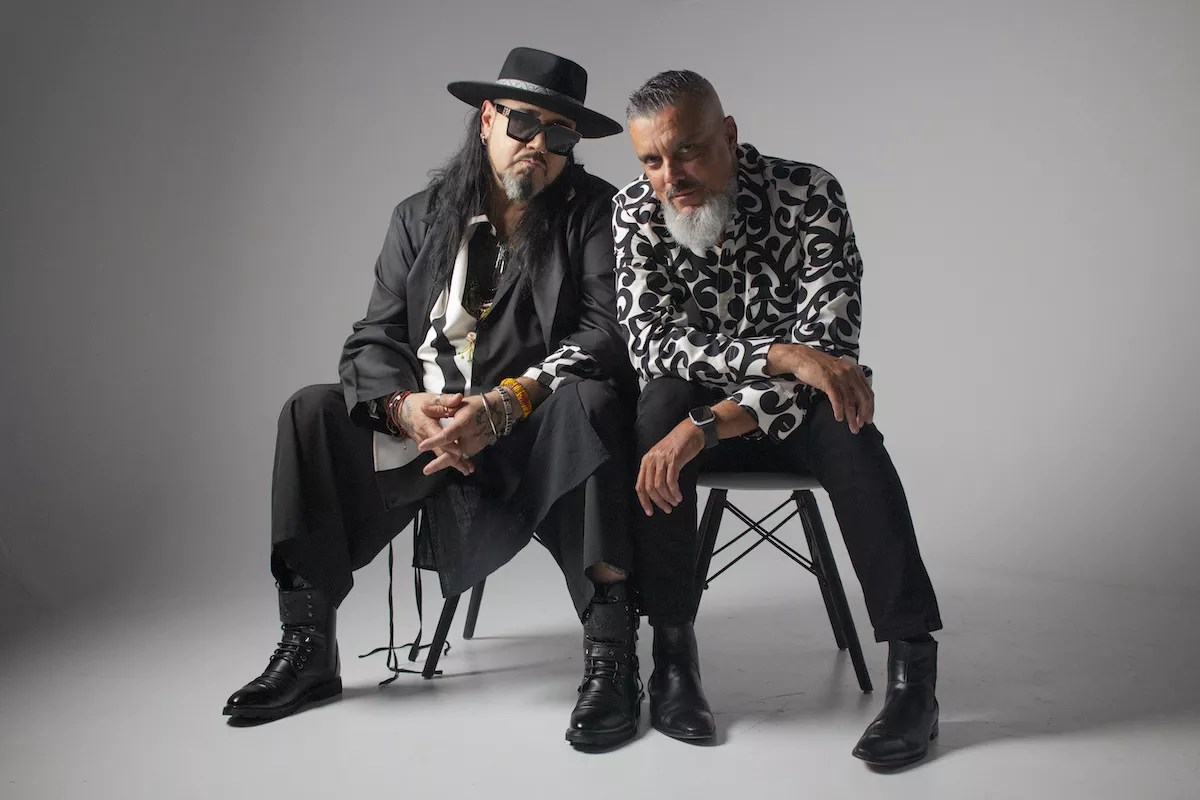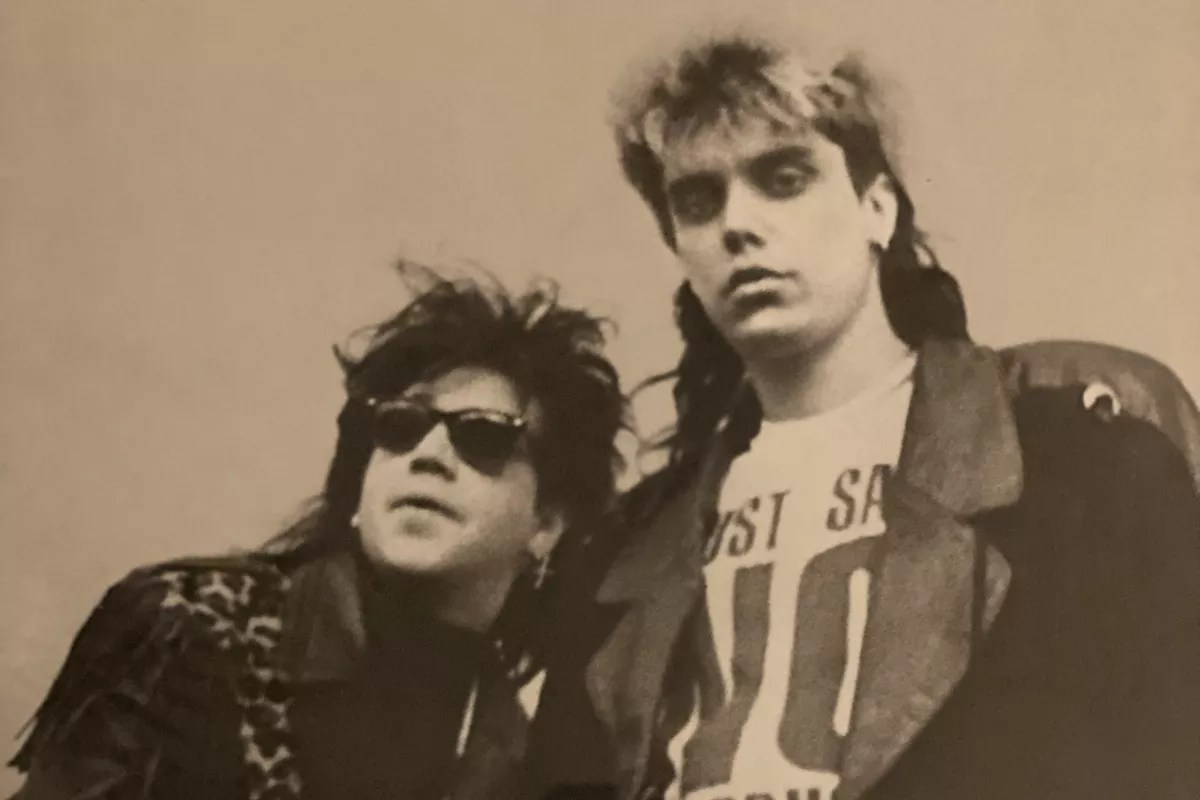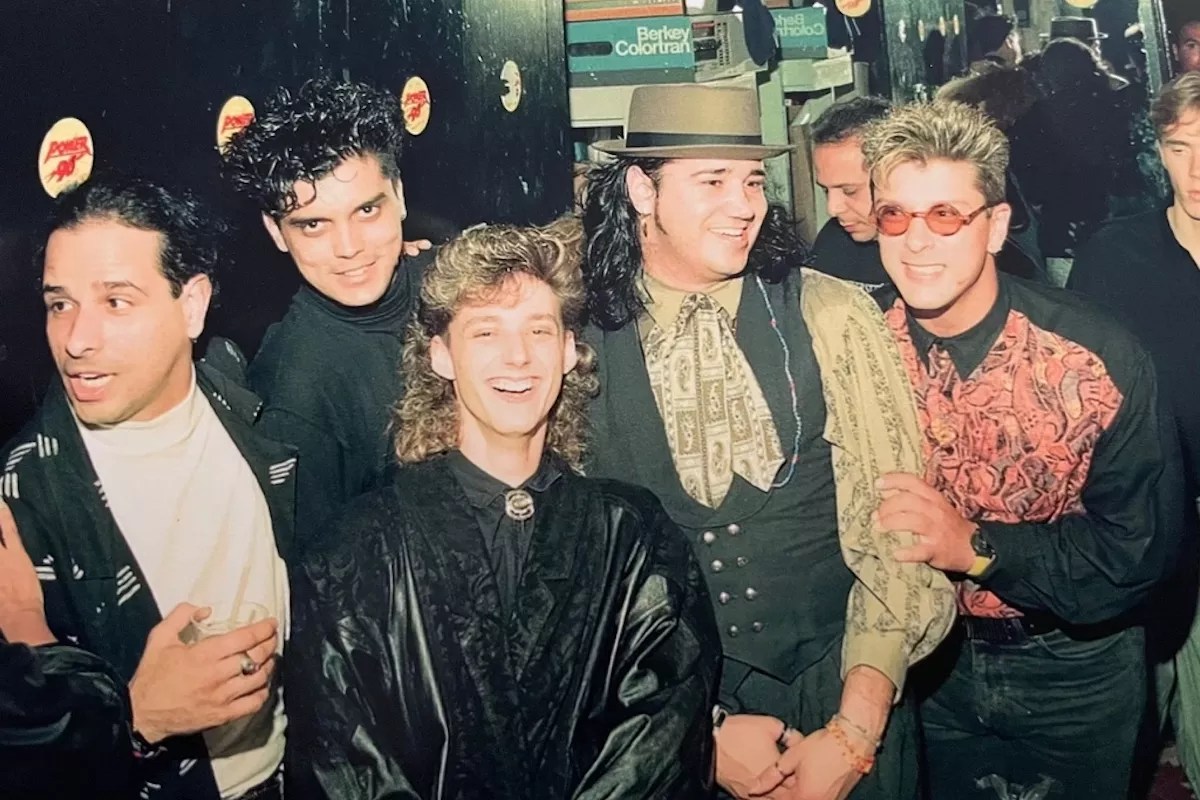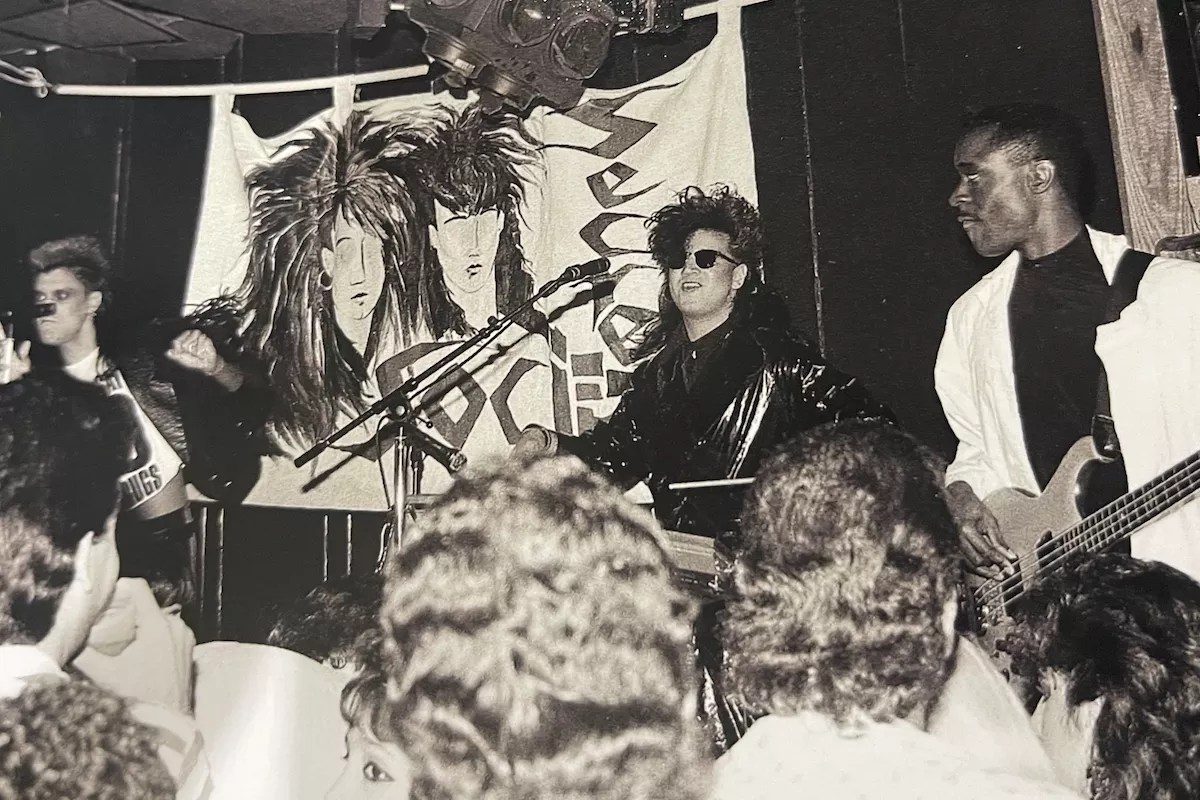
Photo by Michael Campina

Audio By Carbonatix
One afternoon in April, Frank Lords was sitting by the swimming pool when he received a phone call from an unknown number. He usually doesn’t answer that sort of call, but something compelled him to pick up. It was Rudy Gil, his former music partner.
“He just jumped straight into it,” Lords recalls. “He said, ‘I need your help. I’m doing a country [music] record, and I really want you to help me produce the vocal.'”
The call came as a surprise to Lords. He hadn’t spoken to Gil in years.
“It was a very humble approach on his part,” he says. “That immediately brought me down from a whole cloud of bad memories that were produced for 25 years in my head.”
In the late 1980s, if you turned the radio dial to any Miami dance station, you were likely to hear Secret Society, the synth-pop group cofounded by Gil and Lords in 1985 that combined their affinity for British alternative pop and Afro-Cuban percussive beats. The result was a string of club and radio hits, including “Why Did You Run Away,” “Find Yourself,” and “We Belong Together,” that shaped the duo’s legacy as pioneers of Miami freestyle music.
By 1990, the pair had signed a multi-album distribution deal with PolyGram Records, and there was discussion of a major concert tour – but things quickly fell apart. Not long after, Gil and Lords severed ties.
Now, after more than two decades, Secret Society is back. The duo is remixing old music, writing new music, and sharing updates on social media. They are also rehearsing for a live show – a prospect once unheard of among Secret Society fans – on Saturday, October 30, at Cevecería La Tropical.

Secret Society’s first promo shot, from 1985.
Photo by Hector Jordan
Speaking with New Times, Gil and Lords provided a glimpse into their back story, how they reconciled their differences, and why this second time around is for real.
“As you get older, you start seeing things differently,” Gil says. “I said to myself, I am going to call my buddy Frank, and he’s going to freak out, and this is either going to be yea or fucking nay forever.“
Lords agreed to meet Gil at Criteria Recording Studios, the North Miami landmark whose walls are adorned with platinum records by past clients such as the Eagles and Fleetwood Mac.
“Just walking into Criteria with Rudy was like walking into a time machine because of so many years that we had done this together in the past,” Lords says.
They got to work immediately – but only on Gil’s country-music track.
Later that same night, Lords’ head was buzzing with possibilities.
“Secret Society never died. The fans kept it alive,” he says. “I asked myself, Do I really want to die without ever making music with this man again? I have always loved this man. Rudy Gil is a part of my history.”
Lords reached out to Gil, wanting to work out their differences.
The next day, the pair met at Monty’s Raw Bar in Coconut Grove with their former road manager, Joe Blanco, and talked things over. After lunch, Gil turned on his phone’s camera and filmed the group’s post-meeting exuberant mood on Facebook. A visibly content Lords, who was sitting to Gil’s right, looked into the camera lens and said, “We’re back,” elongating the second word as two syllables for emphasis.

Road manager Joe Blanco, Rudy Gil, keyboardist Doug Emery, Frank Lords, and saxophonist Bobby Martinez backstage at Casanova’s nightclub in Hialeah in 1989.
Photo by Victor Jinete
In 1985, one year removed from high school, Gil was a solo artist, writing and recording music on his father’s label, Tania Records. When local nightclubs took an interest in his songs and offered him live gigs, he figured that he needed a band and approached Lords, a drummer, who frequently performed with his band at the Beat Club.
They began meeting at Gil’s house to work on music and collaborated on a track called “Secret Society.”
“That’s us,” says Gil, reflecting on why they adopted the name. “People who are different, have longer hair, have the pink streak, wear a different pair of pants and boots.”
Lords says he and Gil shared a mutual admiration for bands like the Ramones and the Clash.
“We had a look that was completely set apart from everybody else. We were fucking punk rockers,” Lords adds.
Musically, they introduced a unique post-disco, radio-friendly element into the Miami soundscape.
“We were listening to all these new sounds like Planet Patrol with these beats,” says Lords, who, like Gil, was born in Cuba.
After adding a saxophonist and keyboardist to the lineup, Secret Society saw its profile rise locally, performing weekly gigs at venues like Casanovas, Ricks Bar, Parallel Bar, Club Z, City Limits, and Backstreets. The group even performed at the Palladium in New York City.

Frank Lords and Rudy Gil performing at Santa’s Enchanted Forest in Tropical Park in 1986
Photo by Hector Jordan
In 1987, Secret Society released its one and only album, Too Blind to See, featuring the ballad title track frequently played on local radio stations. The band returned in 1989 with “We Belong Together,” which reached number one on New York’s Hot 97 and other radio stations across the U.S. The national attention attracted Sergio Rozenblat, a former A&R rep for CBS Records, who went on to become Secret Society’s manager. Through his industry contacts, Rozenblat secured the band a multimillion-dollar, three-album deal with PolyGram. There were also talks of a tour with the British group Tears for Fears.
But creative differences with the label brought into question its long-term commitment to the band. Ultimately, Secret Society negotiated an unconditional release and parted ways with PolyGram.
By the early 1990s, Secret Society had released a few tracks on a local label. Still, Gil says he was having difficulty understanding the band’s place in an evolving industry that was seeing vinyl records fall behind CD sales and increased demand for hip-hop music.
He and Lords also began drifting apart.
“I remember having this conversation with Frank,” Gil says. “It was too much to tackle at one time, and we were not making the money we used to make.”
Gil believes if they’d returned to their roots and produced another song like “We Belong Together,” they’d have climbed to the top of the dance charts.
“Rudy was never really the risk taker,” says Lords, who wanted to take the band’s sound in a jazzier direction. “Rudy was more safe with his music. I always wanted to be on the limb and do what I felt.”
“Frank was always a little more rebellious,” Gil puts in. “I had my 10 percent rebel, 90 percent give-the-people-want-they-want kind of thing.”

Secret Society performing at Banana Boat in 1986.
Photo by Victor Jinete
Around 1994, Gil walked away from Secret Society, leaving Lords feeling resentful.
Lords tried to keep the band alive, securing investment capital to fund new musicians, including a vocalist.
“I had a guy that looked and sounded exactly like Rudy,” he says.
But after the group’s third live performance without Gil, it didn’t feel right.
“I pulled the plug,” Lords says.
Meanwhile, Gil moved into regular paying jobs, working as a court-appointed bailiff and, later, as a corrections officer. On the side, he continued writing music and taught himself how to play the piano, and bought recording equipment to set up a home studio.
“You can’t deny who you are,” says Gil, who continued to perform at private parties and weekend club gigs, incorporating Secret Society cuts into his repertoire. Throughout the years, he was asked whether he and Lords would reunite. “‘Hell no,’ I would say – but that was my ego talking. My grandfather used to always say, ‘Never, ever spit up because it lands in your face.'”
An avid boater, Gil eventually became a yacht broker and a licensed fishing charter captain. The time away at sea seems to have had an almost epiphany-like effect on him.
“I want my oceans and my wind to be calm. I don’t want any more bullshit,” Gil explains. “There is no reason for me and Frank to be hostile with each other.”
The duo recently produced a new track, “Games That U Play,” self-released via Miami Moon Records. The song is the quintessential Secret Society sound.
“It’s great to be back with [Frank],” Gil says. “I can feel his good energy. I can see how he has changed. I am sure he feels my difference.”
“This is not a resurrection [of the band]; this is a reinvention,” Lords offers. “Me and him are now two different people. We’re older; we’re wiser. We are not about this pride bullshit, ego bullshit that messes up a lot of relationships. This is a brand new group, with brand new ideas, brand new egos because we don’t have that ego-thing that killed us last time. We are not concerned about the past.”
These days, Gil and Lords are speaking every day and hitting on all cylinders creatively.
“Music is just coming out of us – it is oozing out,” Lords says. “I guess, universally, we are just in the right place right now.”
A Night in Havana with Secret Society. 10 p.m. Saturday, October 30, at Cervecería La Tropical, 42 NE 25th St., Miami; 305-741-6991; cervecerialatropical.com. Tickets cost $60 to $100 via eventbrite.com.